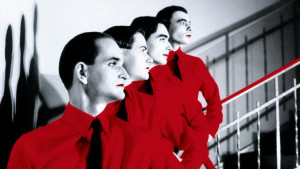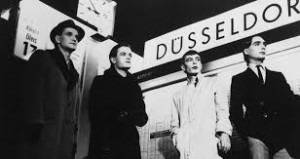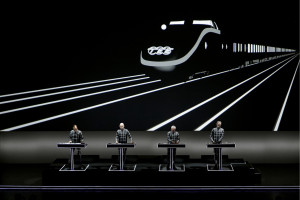Welcome back to Musique Nonstop!
Last week, we talked about German lieder, which may as well be the posterchild for lyricism. (Click here for last week’s Lieder tidbits!) But now it’s time to leave the romanticism and musical conventions of the 19th century behind and jump into the 20th century’s emerging computer world and the birth of electronic music.
Before we get into it, I need a raising of hands. How many of you listen to electronic music? If you said yes and your answer is Skrillex, get out. (No I’m just kidding! I’m only mildly judging you.) While Skrillex is a valid electronic musician, it irks me when people claim that he is the most innovative musician of our time. There is another group who has been around much longer, their influences spread wider, and their genius coveted only by true fans. A band that has even inspired a certain blogger to use one of their song titles as her column name (ahem).
Let’s talk Kraftwerk. Welcome to Electronic Music 101.
 For me, I think it’s fascinating to delve into the origins of music and I’ve made it my mission to rub it in people’s faces that Kraftwerk are one of the founding fathers of electronic music. They were one of the first to experiment with synthesizers and computers, put ‘em together, and call it music. It’s crazy how all it took were a couple of German guys back in the ‘70s fiddling around with the new inventions of the day to commercialize and spawn electronica.
For me, I think it’s fascinating to delve into the origins of music and I’ve made it my mission to rub it in people’s faces that Kraftwerk are one of the founding fathers of electronic music. They were one of the first to experiment with synthesizers and computers, put ‘em together, and call it music. It’s crazy how all it took were a couple of German guys back in the ‘70s fiddling around with the new inventions of the day to commercialize and spawn electronica.
At first, the group formed for strictly experimental purposes, sampling and experimenting with mechanically created sounds and effects. Interestingly, the founders of the group, Ralf Hutter and Florian Schneider-Esleben, both came from classical music backgrounds and had gone to the Dusseldorf Music Conservatory together during college. They recorded the sounds of outside street activity, like the revving of cars, and played with distorting the sounds and layering them on top of each other. Soon, their fan base grew so rapidly that they began creating songs and albums, quickly becoming one of the most revolutionary music groups in existence. Eventually, their experimentation led to new genres of electronic music like synthpop and techno, and the birth of groups like Depeche Mode and Ultravox starting in the 1980s. Since then, almost every musician, electronic or not, has been influenced by Kraftwerk to some extent. People from Dr. Dre to Miley Cyrus and Coldplay have sampled Kraftwerk in their songs, just to name a few.
Intrigued yet?
Let’s listen to them shall we? Here’s a fun one:
The best part of playing Kraftwerk to newbies is that their initial reaction tends to be “Elise, you’ve given me crap.” But is it crap? Is it music? Well it was my bedtime music as a kid, so that has to count for something, right? (I’m not joking here.)
What never ceases to fascinate me is how all music derives from one source, just how languages and cultures share a common origin. At first, a German lieder piece and a song from Kraftwerk may seem drastically different, but if you’re looking for it, Kraftwerk’s  classical music background is often reflected in their electronic music. In fact, I’d argue that Kraftwerk is among the most melodic electronic groups you can find. Some albums, like Computerworld, are particularly “lyrical” if you were to isolate the melody lines from the sound effects. The basic musical construction of Kraftwerk’s compositions is consistent among other genres: an opening build-up section, a grounding melody line connected by a musical bridge. Despite popular belief, no matter how obscure and chaotic electronic music sounds, or however much my grandfather complains, the electronic artist is a musician. They have to meticulously compile and layer the sounds and effects with careful precision; there is no aimless randomization, and there are reasons for every dink and ping or industrial bassline. Part of artistry and musicality is intention, and electronic music is no exception.
classical music background is often reflected in their electronic music. In fact, I’d argue that Kraftwerk is among the most melodic electronic groups you can find. Some albums, like Computerworld, are particularly “lyrical” if you were to isolate the melody lines from the sound effects. The basic musical construction of Kraftwerk’s compositions is consistent among other genres: an opening build-up section, a grounding melody line connected by a musical bridge. Despite popular belief, no matter how obscure and chaotic electronic music sounds, or however much my grandfather complains, the electronic artist is a musician. They have to meticulously compile and layer the sounds and effects with careful precision; there is no aimless randomization, and there are reasons for every dink and ping or industrial bassline. Part of artistry and musicality is intention, and electronic music is no exception.
 Now one can’t talk about Kraftwerk without addressing the visual component. They are especially unique in that their performances are incredibly psychedelic. I had the luck to go to a Kraftwerk concert last Spring, and I’ve gotta say, seeing them live was surreal.
Now one can’t talk about Kraftwerk without addressing the visual component. They are especially unique in that their performances are incredibly psychedelic. I had the luck to go to a Kraftwerk concert last Spring, and I’ve gotta say, seeing them live was surreal.
Their stage set-up is simple: four podiums evenly spaced, each concealing separate controllers to manipulate effects, and a huge projection screen. This has remained consistent for the last 40 years. In more recent years, each audience member receives a pair of 3D glasses. And when the performance starts…
Just, whoa.
Take a look:
Crazy huh? But so totally awesome.
Here are some other songs worth your time:
Relatively tonal:
…Was ist das?
P.S.: Radioactivity that I showed you earlier is a very special Kraftwerk composition. Even though the song was released in 1975, this particular Kraftwerk tour was live in Tokyo specially a year after the 2011 tsunami in Japan to protest against nuclear power and acknowledge the widespread radioactivity poisoning.







